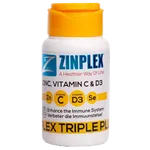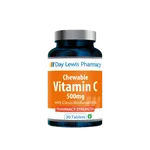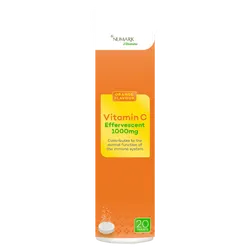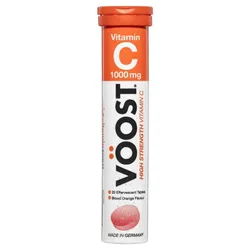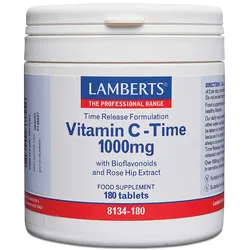Health Benefits of Taking Vitamin C

Vitamin C is an essential nutrient that plays a crucial role in various functions within the body. It is particularly important for strengthening the immune system, helping to protect the body against infections and diseases. Additionally, Vitamin C is vital for the production of collagen, a protein that is necessary for the maintenance of healthy skin, blood vessels, bones, and connective tissues.
Weldricks Pharmacy provides comprehensive information about what vitamin C is, its specific roles within the body, and the numerous potential benefits associated with taking vitamin C supplements. These supplements can help ensure you are meeting the recommended daily intake, thereby supporting overall health and well-being on a daily basis.
What is vitamin C?
Vitamin C, scientifically referred to as ascorbic acid, is a vital nutrient that our bodies cannot synthesize or store because it is water-soluble. Despite this limitation, it is indispensable for several critical physiological processes, including the maintenance of healthy skin, the promotion of wound healing, and the enhancement of immune function. Therefore, it is essential to consume an adequate amount of this nutrient daily through dietary sources or supplements to prevent deficiency and support overall health.
Which foods are high in vitamin C?
The best and recommended way to ensure you are consuming sufficient amounts of vitamin C to ensure your body can reap the health benefits is to eat a balanced, healthy diet with a combination of fruit and vegetables.
Some of the foods highest in levels of vitamin C include:
-
Citrus fruit and juices
-
Peppers
-
Berry fruits
-
Broccoli
-
Brussels sprouts
-
Potatoes
-
Red cabbage
-
Kiwi
-
Tomatoes
-
Watermelon
-
Cauliflower
-
Pineapples
How much vitamin C is needed for men and women?
The NHS claim that adults between the ages of 19 and 64 require at least 40mg of vitamin C each day. The recommended dosage for healthy women is 75mg per day and for men 95mg per day. Pregnant women are recommended a higher dose of 120mg per day (Harvard Health Publishing).
Can you consume too much vitamin C?
There is evidence to support that taking 500mg a day of vitamin C is safe and healthy to do. However, although taking vitamin C can have various health benefits, particularly for those who are deficient or struggle to consume enough of the nutrient from their diet day-to-day, you do need to be wary of the dosage of supplements.
Taking large amounts (more than 2000mg per day, however, this differs slightly between men and women) is likely to cause negative side effects such as stomach pain, diarrhoea and flatulence. Be cautious when taking supplements or vitamins so that you don’t overdo them and always take the recommended amount per day.
What are the potential health benefits of vitamin C?
Strengthens the immune system
Vitamin C is an antioxidant, which are molecules that boost the body’s natural defences by protecting cells from accumulations of free radicals. Free radicals can cause oxidative stress and damage to the body, a state that has been linked to the development of chronic diseases and inflammation.
By consuming the recommended amount of vitamin C each day you can maintain and increase the antioxidant levels in your blood and reduce the risk of illnesses like heart disease. Vitamin C deficiencies, therefore, result in impaired immunity and higher susceptibility to infections (source).
Prevents gout
Vitamin C is important for reducing blood uric acid levels in the blood, a waste product of the body which, when deposited in the joints, can cause gout. Gout involves severe swelling and pain around the affected area and usually affects the big toe.
A healthy daily amount of vitamin C reduces the levels of uric acid in the blood, meaning vitamin C supplements can be beneficial in the prevention of gout (source).
Skin healing ability
Antioxidants, vitamin C, are shown to help strengthen the skin’s natural barrier. In addition, the body needs the recommended amount of vitamin C to be able to produce collagen, something that our body produces to keep our skin healthy, and plump and maintain its ability to heal from wounds.
Collagen is essential for the maintenance of strong bones, cartilage, teeth and skin, therefore vitamin C supplements are often recommended by healthcare professionals when people are recovering from injuries. Both topical application and increased vitamin C intake have been shown to improve the rate of wound healing in children with burns, for example (source).
It’s important to ensure all health benefits that vitamin C products are claimed to have been backed by research.
Types of vitamin C supplements
Ultimately, the most effective way to ensure adequate vitamin C intake is by maintaining a balanced diet that includes foods naturally abundant in vitamin C, as discussed earlier. Nevertheless, for individuals who are experiencing a deficiency in vitamin C or those who wish to incorporate greater quantities of this essential nutrient into their daily routine, there is a broad selection of vitamin C supplements available on the market.
Vitamin C supplements are offered in a variety of types and forms. It is crucial to carefully examine the dosage instructions on these supplements to make sure that you do not surpass the recommended daily allowance, thereby avoiding potential health risks associated with excessive intake.
Different types of vitamin C used in supplements include:
-
L-ascorbic acid
-
Combination supplements commonly containing sodium or calcium
-
Acerola powder with high ascorbic acid levels
-
Camu Camu, a type of berry from the Amazon rainforests
-
Citrus bioflavonoids from citrus fruits like oranges
-
Rose hips from a wild plant
Different forms of vitamin C supplements include:
-
Chewable tablets or gummies
-
Capsules or tablets
-
Dissolvable powders and tablets to add to water
Who is advised to take vitamin C supplements?
Certain groups of people are more at risk of developing a vitamin C deficiency than others and should therefore consider taking vitamin C supplements, including:
-
Smokers or those often exposed to smoke or other types of air pollution
-
Infants only fed evaporated or boiled milk
-
Those who don’t have a balanced or healthy diet rich in foods that provide vitamin C
-
Those with weakened or poor immune systems or defences
-
Those that suffer from certain health conditions such as gout, anaemia, or low blood pressure
It is important to note that despite vitamin C having various important benefits for immunity, healing and overall well-being, taking supplements is not advisable for everyone. If you are taking medication or receiving treatment for a condition, you should always check with your local pharmacist or GP before taking vitamin C supplements as higher levels of the nutrient can occasionally interact negatively with other medication.
Browse our vitamin C products
Weldricks Pharmacy stock a wide range of vitamins and supplements including an array of vitamin C supplements in various forms and dosages so you can factor it into your lifestyle. Browse our range of products below.
Vitamin C tablets and capsules
Vitamin C chewable tablets and gummies
Vitamin C dissolving tablets
-
Valupak Vitamin C Effervescent High Strength 1000mg Pack of 20 £2.29 save £0.11
-
Numark Vitamin C Effervescent 1000mg Tablets Pack of 20 £1.75 save £0.44
-
VOOST Vitamin C 1000mg Effervescent Tablets Pack of 20 £4.39 save £1.10
Vitamin C syrups
Related Products
-
Valupak Vitamin C Effervescent High Strength 1000mg Pack of 20 £2.29 save £0.11
-
Numark Vitamin C Effervescent 1000mg Tablets Pack of 20 £1.75 save £0.44
-
Lamberts Vitamin C Time with Bioflavonoids Tablets 1000mg Pack of 180 £16.49 save £3.46
-
VOOST Vitamin C 1000mg Effervescent Tablets Pack of 20 £4.39 save £1.10
